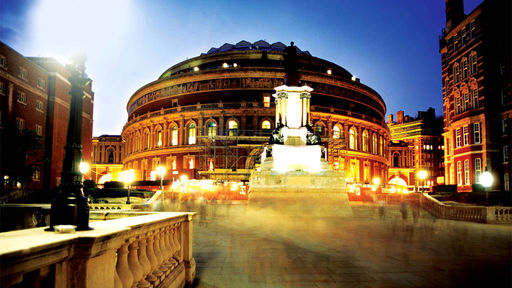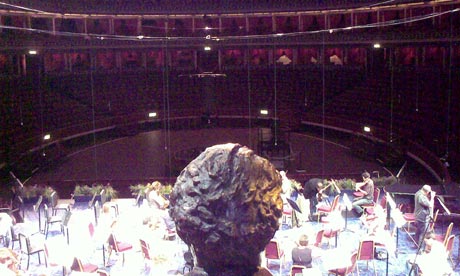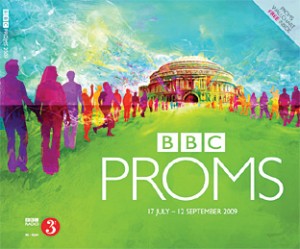 On Aug 9 The BBC National Orchestra of Wales, conducted by David Atherton, presented the first performance of …onyt agoraf y drws…(…unless I open the door…) by Welsh composer Guto Puw. The title of the piece refers to a Welsh saga in which, after suffering heavy losses in a battle with the Irish, and the death and beheading of Bedndigeidfran, his men, having been enchanted, return to Harlech and feast happily for seven years entertained by the singing of Rhiannon’s birds and cheerfully conversing with Bendigeidfran’s severed head, without any recollection of their past troubles. Eventually they move on to a hall in Pembrokeshire, where they continue partying happily for another 80 years, never in any of this time either aging nor remembering the past. The hall has three doors at its end, and they are told that they should not open the third door. When they eventually and inevitably succumb to temptation and open the door, they are flooded with all the tragic memories which their enchantment has spared them, except with even greater intensity and greater sorrow.
On Aug 9 The BBC National Orchestra of Wales, conducted by David Atherton, presented the first performance of …onyt agoraf y drws…(…unless I open the door…) by Welsh composer Guto Puw. The title of the piece refers to a Welsh saga in which, after suffering heavy losses in a battle with the Irish, and the death and beheading of Bedndigeidfran, his men, having been enchanted, return to Harlech and feast happily for seven years entertained by the singing of Rhiannon’s birds and cheerfully conversing with Bendigeidfran’s severed head, without any recollection of their past troubles. Eventually they move on to a hall in Pembrokeshire, where they continue partying happily for another 80 years, never in any of this time either aging nor remembering the past. The hall has three doors at its end, and they are told that they should not open the third door. When they eventually and inevitably succumb to temptation and open the door, they are flooded with all the tragic memories which their enchantment has spared them, except with even greater intensity and greater sorrow.
The strength of Puw’s piece, which depicts the partying and the aftermath of the opening of the third door, is in its orchestration and its writing for instruments, which is masterly and colorful. The beginning music is bustling and cheerful, featuring the piccolo alluding to Rhiannon’s birds and the gradual emergence of a Welsh foksong (‘Machynlleth’); Puw uses sustained chords trading off between various sections of the orchestra in the midst of the general bustle to suggest time’s standing still. Although this first section is involved with the opening of the first two doors, it doesn’t actually depict those two openings, only the general party atmosphere during that time. There is a moment depicting the opening of the third door, but the sense of any change in the emotional atmosphere in its aftermath is almost completely lacking. Puw’s program note claims greater chromaticism at this point, but it is only slightly more so than formerly, and doesn’t read as any kind of real change. An Irish reel thrown into the texture may be supposed to allude to the enemy that defeated the Welsh in the battle, but the whole tenor of things is just as jolly as ever, so one misses a sense of any dire consequences from the opening of the third door. It may be that Puw was worried about being too vulgarly pictorial, but, in fact, for this listener vulgar pictorialism, especially at that point, was just what the piece could have used more of.
The Puw was followed by the Walton Viola Concerto in a very fine performance, with Lawrence Power as the soloist, and the Rakhmaninov Symphonic Dances, played about as well as one could ever hope to hear them played. Although both of those pieces are quite high grade stuff, they both leave me a little cold. In the case of the Walton this makes me a little sad, since I generally like his music and I’ve often tried to like it, but it always seems to me to be a little aimless and featureless, lacking in color and nice tunes. The concert on August 16th with the Bergen Philaharmonic, conducted by Andrew Litton, presented Walton’s First Symphony, one of his very best pieces, which is full of color of all sorts, tuneful, and tightly and impressively made, particularly in its incessantly abrasive scherzo and its intensely sad slow movement. In a performance as good as this one was, it’s completely thrilling.
The Prom concert on August 7 began with Britten’s Sinfonia da Requiem, Op. 20, the intensely dramatic and mostly pessimistic piece, with each of its movements referring to a section of the requiem mass, which, bizarrely enough, Britten had thought, in 1939, was just thing to satisfy a commission from the Japanese government to celebrate the 2,600th anniversary of the Japanese Empire. (In the event, the Japanese rejected the piece on religious grounds, and added that it didn’t sufficiently ‘express felicitations’ for the event.) Although in three movements, the work is really in one very tightly constructed span, starting with a slow lamenting march, moving through a relentless and ferocious ‘Dance of Death’ scherzo, and ending with a serene peaceful apotheosis of the material of the first two movements. The completion of Mahler’s 10th Symphony, by Derek Cooke and others, which followed, is, of course, not exactly the piece, but rather a very fully fleshed out version of Mahler’s sketches for the work as he left them when he died (described by David Mattews, who was one the people responsible for the realization, as having been in ‘a complex state of incompleteness’), suggesting what the piece might have been like had he finished it. Mahler’s sketches included a full score of the first movement, a ‘full score sketch’ of the second, a full score for the beginning of the third movement, followed by a short score, and an indication of ‘da capo’ for the first section, and short scores for the fourth and fifth movements. Although in many places the texture is very thin (one line) there are no gaps in its continuity, so the length and scope of the piece is fairly clear, even if many of the details are not worked out, so the realization consists of filling out textures and, in certain places, of making decisions about orchestrations. The Mahler is probably a little less complete in its realization of what the piece might have been like than is the Mozart Requiem, and a little more so than the Bartok Viola Concerto. The performances of both of these two works, by BBC Philharmonic, conducted by Gianandrea Noseda, were somewhat understated, if not downright bland. It would have been good in each case to have had a more urgent sense of the drama of the work, since both have plenty of drama. I found particularly bothersome in the Mahler, the modern almost complete avoidance of portimento in the strings, even when it was indicated in the score and the music cried out for it.
Proms concerts are available on line for listening at http://www.bbc.co.uk/proms/2007/.
 One of the most appealing and satisfying things about the Proms is the way that they support and showcase British composers. There are a number of commissions each year (a Proms commission is a sort of right of passage moment for up and coming composers), and not first performances of recent works as well. It is very surprising, and a just cause for sorrow and consternation, then, that the Proms Matinee on August 11 at Cadogan Hall, given by Britten Sinfonia, with soloists Nicolas Hodges, Susan Bickley, and Nicholas Daniel, conducted by Clark Rundell, was the occasion of the first Proms performance in twenty-four years of any music of Michael Finnissy. Finnissy, as well as being one of the most vital and interesting composers alive, is undoubtedly one of the major figures of British music, as a teacher as well as a composer, and the absence of his music from the Proms for so long, let alone his not having received a Proms commission, over all that time is simple inexplicable, as well as being sad for all of us who have lost by such an omission.
One of the most appealing and satisfying things about the Proms is the way that they support and showcase British composers. There are a number of commissions each year (a Proms commission is a sort of right of passage moment for up and coming composers), and not first performances of recent works as well. It is very surprising, and a just cause for sorrow and consternation, then, that the Proms Matinee on August 11 at Cadogan Hall, given by Britten Sinfonia, with soloists Nicolas Hodges, Susan Bickley, and Nicholas Daniel, conducted by Clark Rundell, was the occasion of the first Proms performance in twenty-four years of any music of Michael Finnissy. Finnissy, as well as being one of the most vital and interesting composers alive, is undoubtedly one of the major figures of British music, as a teacher as well as a composer, and the absence of his music from the Proms for so long, let alone his not having received a Proms commission, over all that time is simple inexplicable, as well as being sad for all of us who have lost by such an omission.


 On Aug 9 The BBC National Orchestra of Wales, conducted by David Atherton, presented the first performance of …onyt agoraf y drws…(…unless I open the door…) by Welsh composer
On Aug 9 The BBC National Orchestra of Wales, conducted by David Atherton, presented the first performance of …onyt agoraf y drws…(…unless I open the door…) by Welsh composer